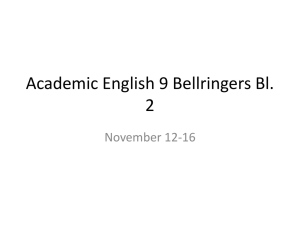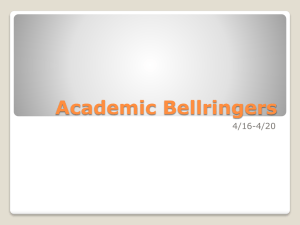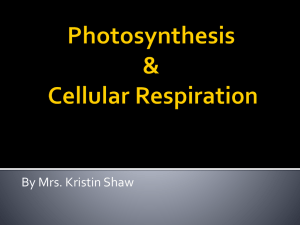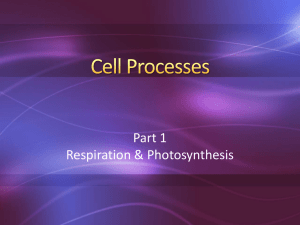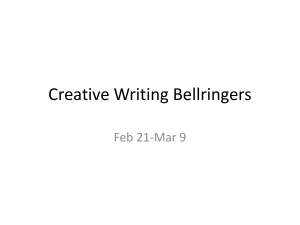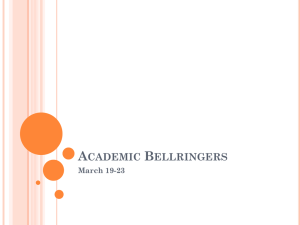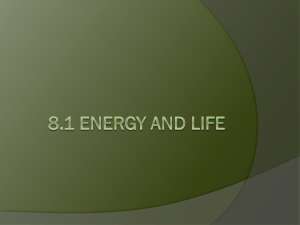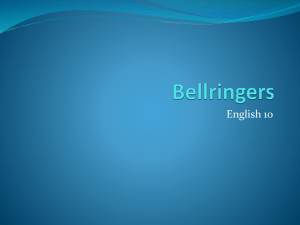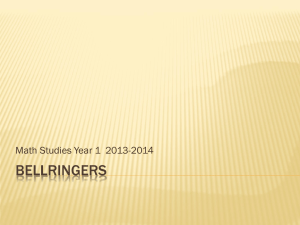PHOTOSYNTHESIS/CELL RESP. BELLRINGERS
advertisement
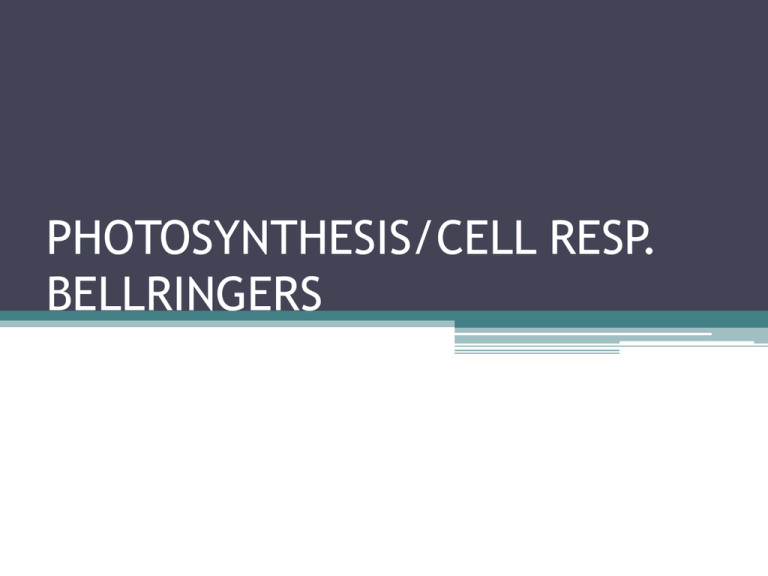
PHOTOSYNTHESIS/CELL RESP. BELLRINGERS Cellular Energy Bellringer #1 Rate of photosynthesis What does this graph tell you about the effect of light on the rate of photosynthesis? Light intensity Cellular Energy Bellringer #2 Rate of photosynthesis • What does this graph tell you about the effect of temperature on the rate of photosynthesis? Temperature Cellular Energy Bellringer #3 • Identify five things that can slow down the rate of photosynthesis. Cellular Energy Bellringer #4 A B C E D Use the following terms to identify A-E on the diagram: Water Oxygen Glucose Energy Carbon Dioxide Cellular Energy Bellringer #5 Complete the following Venn Diagram to compare and contrast mitochondria and chloroplasts. And YES, it MUST be a Venn Diagram!!! 10/1—Binder Time • Clear your desk of everything EXCEPT your Science Binder. • As your assignments are being handed back to you, place them in the correct section of your binder. • HOLE-PUNCH them & put them in the rings, NOT THE POCKETS! • Order: Chronological per section. ▫ Example: BR section, first paper should be the August bellringers, last should be the October bellringers. Cellular Energy Bellringer #6 Look at the graph to the left. It shows two plants; one exposed to low light, and one exposed to moderate light, and the amount of chlorophyll produced. Which of the two lighting conditions would you want to expose plants to in order to maximize photosynthesis? Explain your answer. Cellular Energy Bellringer #7 • Identify four things that will SLOW down the rate of cellular respiration. Cellular Energy Bellringer #8 • Give the complete, BALANCED equations for both photosynthesis and cellular respiration. 11 Cellular Energy Bellringer #9 Referring to the diagram above, which of these processes does NOT return carbon dioxide to the atmosphere? 12 Cellular Energy Bellringer #10 Draw the following chart in your bellwork and fill in the boxes: Reactants Photosynthes is Respiration Products 13 Cellular Energy Bellringer #11 One of the products of photosynthesis is glucose (C6H12O6). Which of the following statements about glucose is FALSE? 1. Plants use the energy from glucose to convert nutrients to body tissues and grow larger. 2. Glucose is used to create a variety of plant products. 3. Glucose that is not immediately used by the plant is stored for later use. 4. Glucose that is not immediately used by the plant is lost as waste material. 14 Cellular Energy Bellringer #12 1. At what pH is the enzyme most active? 2. According to the graph, how does pH affect the function of an enzyme? 15 Cellular Energy Bellringer #13 • Which one of these lines is employing the use of an enzyme? Cellular Energy Bellringer #14 1. At what pH is pepsin most active? 2. At what pH is trypsin most active? 3. At what pH are pepsin and trypsin BOTH active? 17 Cellular Energy Bellringer #15 Rate: Molecules per second Body Tem p vs. Protein Production Rate 1000 900 800 700 600 500 400 300 200 100 Tem p ( F) 1. At what temperature are the bacteria producing the most protein? 2. Why is there a sudden drop in the bacteria’s ability to make proteins beyond 100 degrees Fahrenheit?
